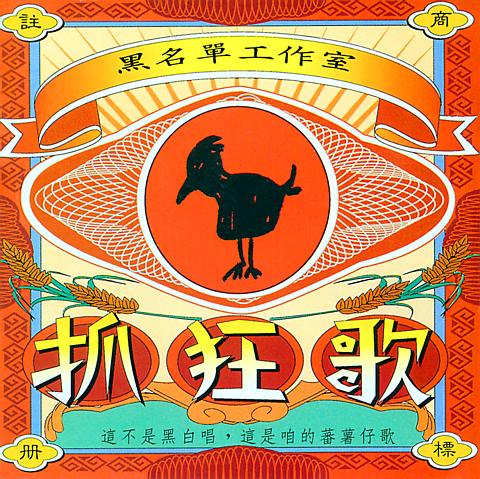Musician Joe Wang (王明輝) remembers 1989 well. Political demonstrations brought turmoil to Taiwan society. Long-suppressed social forces were being released from long-term dictatorship. And the first official opposition party -- the DPP -- was using a strategy of protest to clash with the KMT regime.
It was also the year that an unprecedented Taiwanese language album appeared on the market, titled Songs of Madness (抓狂歌) and subtitled "These aren't crap songs, these are our yam songs" (yam is a symbol of Taiwan). It was produced by Black List (黑名單工作室) -- comprised of Wang, Io Chen (陳主惠) and Keith Stewart from the US. The album recruited then underground singers such as Chen Ming-chang (陳明章) and Lin Wei-tseh (林瑋哲). The "mad songs" in the album mainly satirized the political situation at that time and ridiculed people's powerlessness in a hyper but chaotic society.
For example, in "Democracy Bumpkin" (民主阿草):

I went strolling in the morning, seeing troops of armed policemen, wondering if they were preparing to fight communists.
My neighbor told me it was against protesters. He said he is something called DPP and it's fun to protest.
There were a bunch of old guys occupying seats in the congress, using our tax money for their medical fees. There were old mainlanders serving the country for 40 years but gaining nothing. I want to protest. I want to protest, they shouted.
"We wanted to record the happenings of Taiwan's society and provide a space for people to think -- through music," Wang recalls. When it comes to protest singers or bands, one might think of Bob Dylan in the 60s, the UK's Billy Bragg in the 80s or Rage Against the Machine in the 90s. In Taiwan, in the late 80s and early 90s, it was Black List and its frontman Joe Wang.
For Wang, Black List's role was to find a way for intellectuals to intervene through music. "Since Lo Ta-yu (羅大佑) in the early 80s, [who sang "Lukang Small Town"], we had not heard an intellectual's voice in the music scene," he says. "For us, we didn't quite believe in sentimental inspiration when we wrote music."
Songs of Madness breaks down the convention of Taiwanese language pop songs, which contain exaggerated elements of lament, either about lost love or good times that can't be relived. But Black List's social criticism cloaked in cynical Taiwanese rap and folk songs, which soon became popular among college students and young middle class. Songs of Madness was labeled by media and critics as the New Taiwanese Songs. Soon, Chen Ming-chang and Lin Wei-tseh became popular songwriters and producers. Chen wrote and produced many award-winning scores for director Ho Hsiao-hsien (侯孝賢) and Lin is now producer of the award-winning singer Faith Yang (楊乃文). But for Wang, who insists on staying aloof from the mainstream, he knew that the New Taiwanese Song movement was no more than a market gimmick. "After Chiang Hui (江蕙) swept away KTV hit rate, the mainstream started to embrace sentiment ballads again," he said.
Wang didn't stop producing alternative music during the 10 years following Songs of Madness, a period during which his star has slowly dimmed. Gradually, Taiwanese language diminished as an essential tool of protest, so Wang shifted his focus to other subjects of social struggle -- for instance, labor and aboriginal issues. "We [Black List] are the only group who cares about the issue of class in Taiwan society," Wang says.

Taiwan has next to no political engagement in Myanmar, either with the ruling military junta nor the dozens of armed groups who’ve in the last five years taken over around two-thirds of the nation’s territory in a sprawling, patchwork civil war. But early last month, the leader of one relatively minor Burmese revolutionary faction, General Nerdah Bomya, who is also an alleged war criminal, made a low key visit to Taipei, where he met with a member of President William Lai’s (賴清德) staff, a retired Taiwanese military official and several academics. “I feel like Taiwan is a good example of

March 2 to March 8 Gunfire rang out along the shore of the frontline island of Lieyu (烈嶼) on a foggy afternoon on March 7, 1987. By the time it was over, about 20 unarmed Vietnamese refugees — men, women, elderly and children — were dead. They were hastily buried, followed by decades of silence. Months later, opposition politicians and journalists tried to uncover what had happened, but conflicting accounts only deepened the confusion. One version suggested that government troops had mistakenly killed their own operatives attempting to return home from Vietnam. The military maintained that the

Before the last section of the round-the-island railway was electrified, one old blue train still chugged back and forth between Pingtung County’s Fangliao (枋寮) and Taitung (台東) stations once a day. It was so slow, was so hot (it had no air conditioning) and covered such a short distance, that the low fare still failed to attract many riders. This relic of the past was finally retired when the South Link Line was fully electrified on Dec. 23, 2020. A wave of nostalgia surrounded the termination of the Ordinary Train service, as these train carriages had been in use for decades

Lori Sepich smoked for years and sometimes skipped taking her blood pressure medicine. But she never thought she’d have a heart attack. The possibility “just wasn’t registering with me,” said the 64-year-old from Memphis, Tennessee, who suffered two of them 13 years apart. She’s far from alone. More than 60 million women in the US live with cardiovascular disease, which includes heart disease as well as stroke, heart failure and atrial fibrillation. And despite the myth that heart attacks mostly strike men, women are vulnerable too. Overall in the US, 1 in 5 women dies of cardiovascular disease each year, 37,000 of them